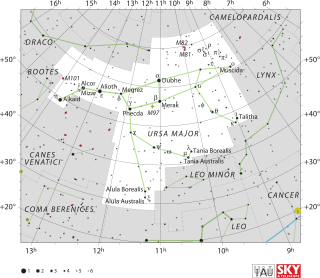| Observation data Epoch J2000.0 Equinox J2000.0 (ICRS) | |
|---|---|
| Constellation | Ursa Major |
| Right ascension | 11h 09m 39.8083s[1] |
| Declination | +44° 29′ 54.5559″[1] |
| Apparent magnitude (V) | +3.01[2] |
| Characteristics | |
| Evolutionary stage | Giant star |
| Spectral type | K1 III[3] |
| U−B color index | +1.12[2] |
| B−V color index | +1.14[2] |
| Astrometry | |
| Radial velocity (Rv) | –3.39[4] km/s |
| Proper motion (μ) | RA: –62.02 mas/yr[1] Dec.: –27.78 mas/yr[1] |
| Parallax (π) | 23.2272 ± 0.2513 mas[1] |
| Distance | 140 ± 2 ly (43.1 ± 0.5 pc)[1] |
| Absolute magnitude (MV) | −0.27[5] |
| Details[6] | |
| Mass | 2.31±0.13 M☉ |
| Radius | 19.12[6]–20.79[7] R☉ |
| Luminosity | 140±3 L☉ |
| Surface gravity (log g) | 2.12±0.05 cgs |
| Temperature | 4,543±6 K |
| Metallicity [Fe/H] | −0.11±0.03 dex |
| Rotational velocity (v sin i) | 5.5[8] km/s |
| Other designations | |
| Database references | |
| SIMBAD | data |
Psi Ursae Majoris (Psi UMa, ψ Ursae Majoris, ψ UMa) is a star in the northern circumpolar constellation of Ursa Major. It has an apparent visual magnitude of +3.01,[2] making it a third magnitude star and one of the brighter members of the constellation. Parallax measurements place it at a distance of 140 light-years (43 parsecs) from Earth.[1] This is sufficiently close that the magnitude of the star is only reduced by 0.05 due to extinction.[4] In Chinese astronomy, Psi Ursae Majoris is called Tien Tsan or Ta Tsun, "Extremely Honorable".[10] The name was possibly derived from the word 太尊, Pinyin: Tàizūn, meaning Royals, because this star stands alone as the only member of the Royals asterism within the Purple Forbidden enclosure (see Chinese constellation).
The spectrum of this star matches a stellar classification of K1 III,[3] with the luminosity class of 'III' indicating this is an evolved giant star that has exhausted the supply of hydrogen at its core. As a consequence, it has expanded to around 20 times the radius of the Sun.[7][6] It is radiating roughly 140 times the luminosity of the Sun from its enlarged outer envelope at an effective temperature of 4,543 K.[6] At this heat, the star glows with the orange hue of a K-type star.[11]
Psi Ursae Majoris is a member of the thin disk population of the Milky Way. It is following an orbit through the galaxy with a low eccentricity of 0.02 that will carry it between 26.5–27.8 kly (8.1–8.5 kpc) from the Galactic Center. The low inclination of its orbit means the star will only stray 130 ly (40 pc) from the galactic plane.[12]
- ^ a b c d e f Vallenari, A.; et al. (Gaia collaboration) (2023). "Gaia Data Release 3. Summary of the content and survey properties". Astronomy and Astrophysics. 674: A1. arXiv:2208.00211. Bibcode:2023A&A...674A...1G. doi:10.1051/0004-6361/202243940. S2CID 244398875. Gaia DR3 record for this source at VizieR.
- ^ a b c d Cite error: The named reference
mnras172_667was invoked but never defined (see the help page). - ^ a b Cite error: The named reference
aaa508_3_1313was invoked but never defined (see the help page). - ^ a b Cite error: The named reference
aaa430_165was invoked but never defined (see the help page). - ^ Cite error: The named reference
Cardini2005was invoked but never defined (see the help page). - ^ a b c d Cite error: The named reference
Soubiran2024was invoked but never defined (see the help page). - ^ a b Cite error: The named reference
gray2019was invoked but never defined (see the help page). - ^ Cite error: The named reference
aj135_1_209was invoked but never defined (see the help page). - ^ Cite error: The named reference
SIMBADwas invoked but never defined (see the help page). - ^ Cite error: The named reference
allenwas invoked but never defined (see the help page). - ^ Cite error: The named reference
csirowas invoked but never defined (see the help page). - ^ Cite error: The named reference
aaa480_1_91was invoked but never defined (see the help page).
